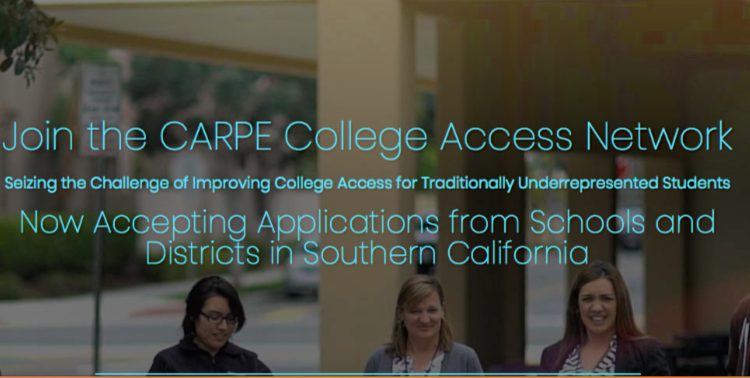College access is not a thing of the past, nor has it been solved. While we may be seeing more students of color and low income students applying and being accepted to four year institutions of higher education, it does not mean that they are all graduating, which is problematic; so much so that funding is being provided to support the efforts in breaking through barriers that get in the way of students accessing higher education. Recently, the Gates Foundation has awarded over $92 million to the cause; I sat down with Edgar Montes and Rodrigo Arancibia, Co-Directors of the College Access Network: CARPE for the High Tech High, Graduate School of Education who recently were awarded $10.3 million dollars to lead this work. According to Edgar, the idea behind the grant is to build and support networks across Southern California to improve the number of minority and low-income students enrolling in four year schools. He hopes to “learn from each other: communities and schools to use tools to dig deeply into those barriers that are in the way preventing students from being successful.”
The great thing about this grant is that it connects organizations. It puts out the call for schools who would like to participate in supporting their students and the larger community in getting to and graduating from college. This will in addition allow schools to take the time to not just dive into this dilemma but also build their capacity at their site by looking at student data to identify and disrupt patterns that may be contributors to the low graduation rates at four year institutions. If you know of a high school that may be interested in participating, please have them visit Carpe’s site to apply.
While this grant is guided towards schools, Rodrigo also discusses the important role of families in this work, “at the heart of all of this, guardians have an opportunity to influence the type of experience that the students go through.” Recently, La Comadre writer, Alicia Aguayo, shared “10 Tips for Parents with First Generation College Students.” Edgar, like Alicia, shares the sentiment of involvement; he encourages parents to know the FAFSA and college application process, ask questions when they don’t know, and work with their students’ school to build an appropriate college list. Lastly, Rodrigo speaks on the importance of letting go, so many students don’t pursue higher education because their families don’t want them to leave, and many who do have the opportunity carry with them the guilt of leaving family behind. The pressures of home remain with them, leading to their return back home and either delaying their college experience, or completely leaving it behind.
Whether you are a parent or an educator, let’s work together to figure out how we can support our students in not just getting to college but graduating!
Diana Cornejo-Sanchez
Latest posts by Diana Cornejo-Sanchez (see all)
- Reflexiones de una Educadora de San Diego Sobre el Cierre Temporal de la Frontera de México y Estados Unidos - November 27, 2018
- Reflections of a San Diego Educator on the Temporary Closure of the U.S.-Mexico Border - November 26, 2018
- Una Cosa es Promover el Acceso a la Universidad y otra es Asegurarse de que los Estudiantes Obtengan sus Diplomas - September 28, 2018
- It’s One Thing to Promote College Access, It’s Another to Make Sure Students Complete Their Degrees - September 26, 2018
- Educadores y Padres: ‘The Hate U Give ‘ Vale la Pena Leerlo - September 17, 2018

